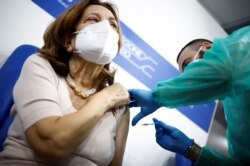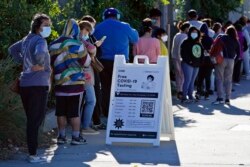Exactly two years after the World Health Organization issued an alert about "a cluster of cases of pneumonia of unknown cause" in the central Chinese city of Wuhan that evolved into the global COVID-19 pandemic, the world is now struggling under the weight of the fast-moving omicron variant of the coronavirus that sparked the disease.
In Brazil, a surge of new COVID-19 cases driven by the omicron variant has prompted authorities in Rio de Janeiro to cancel its iconic Carnival street festival for the second consecutive year.
Rio Mayor Eduardo Paes announced the cancellation Tuesday during a speech carried live online. Paes said the "nature" and "democratic aspect" of Carnival makes it impossible to control the potential spread of the virus.
But Paes said the traditional procession of Rio's samba schools into the city's Sambadrome stadium will take place next month, as authorities will impose mitigation efforts to inhibit the spread of the virus among spectators.
In Hong Kong, chief executive Carrie Lam on Wednesday announced a two-week ban on flights from eight nations to blunt a possible fifth wave of COVID-19 infections driven by omicron. The ban on incoming flights from Australia, Britain, Canada, France, India, Pakistan, the Philippines and the United States takes effect Sunday.
Authorities in the semi-autonomous Chinese financial hub are keeping about 2,500 passengers of a Royal Caribbean cruise ship on board the vessel after discovering that nine passengers were close contacts of an omicron cluster in the city. The Spectrum of the Seas returned to Hong Kong on Wednesday, just days after leaving on a short cruise. The nine passengers were taken off the ship and placed in a quarantine center, where they have all tested negative. The remaining passengers and the ship's 1,200 crew will have to undergo testing before they are allowed to disembark.
Italy has also imposed new measures to battle the virus, announcing Wednesday that COVID-19 vaccination will be mandatory, effective immediately, for people 50 and over. This requirement will remain in place until June 15, according to Reuters.
Overwhelmed by a new wave of coronavirus infections, Italy is one of the few European countries to announce such a measure.
Since February 2020, when the pandemic began in Italy, the country has reported 138,000 deaths from the virus, the second highest death toll in Europe after Britain.
CDC statements
Meanwhile, the U.S. Centers for Disease Control and Prevention (CDC) has added the Caribbean island nation of Aruba on its list of destinations considered as "very high" risk of exposure to COVID-19. The CDC designates as "Level 4" any destination with more than 500 cases per 100,000 residents over the past 28 days.
The CDC issued a statement Tuesday on its controversial new guidelines for people who have been infected with COVID-19. The federal agency came under fire last week when it cut the amount of time infected Americans should quarantine from 10 days to five as long as they have no symptoms, while also stating that testing was not necessary after that five-day period.
Independent health experts urged the CDC to revise the guidelines to include a recommendation to seek testing after the five-day isolation periods amid the ever-growing omicron outbreak. But the agency instead issued documents supporting its new recommendations, while saying at-home rapid tests are not a reliable indication that a person is no longer contagious.
The CDC is recommending that people wear face masks everywhere for five days after emerging from isolation.
U.S. numbers
The U.S. has also reached a record single-day number of COVID-19 cases, with more than 1 million infections reported on Monday, according to data compiled by Johns Hopkins University.
The record high comes as the country continues to battle the omicron variant, resulting in rapid infection across the country on the heels of the holiday season.
Top U.S. infectious disease expert Anthony Fauci warned Wednesday that Americans could not be complacent about the virus' spread, saying that while the omicron variant is less severe, it may still overwhelm the country's health system.
"[Omicron] could still stress our hospital system because a certain proportion of a large volume of cases, no matter what, are going to be severe," Fauci told reporters during a White House briefing.
According to Reuters, hospitalizations of COVID patients have risen by 45% in the past seven days and remain at over 111,000, a rate the country has not seen since January 2021.
Some information for this report came from the Associated Press, Reuters and Agence France-Presse.








